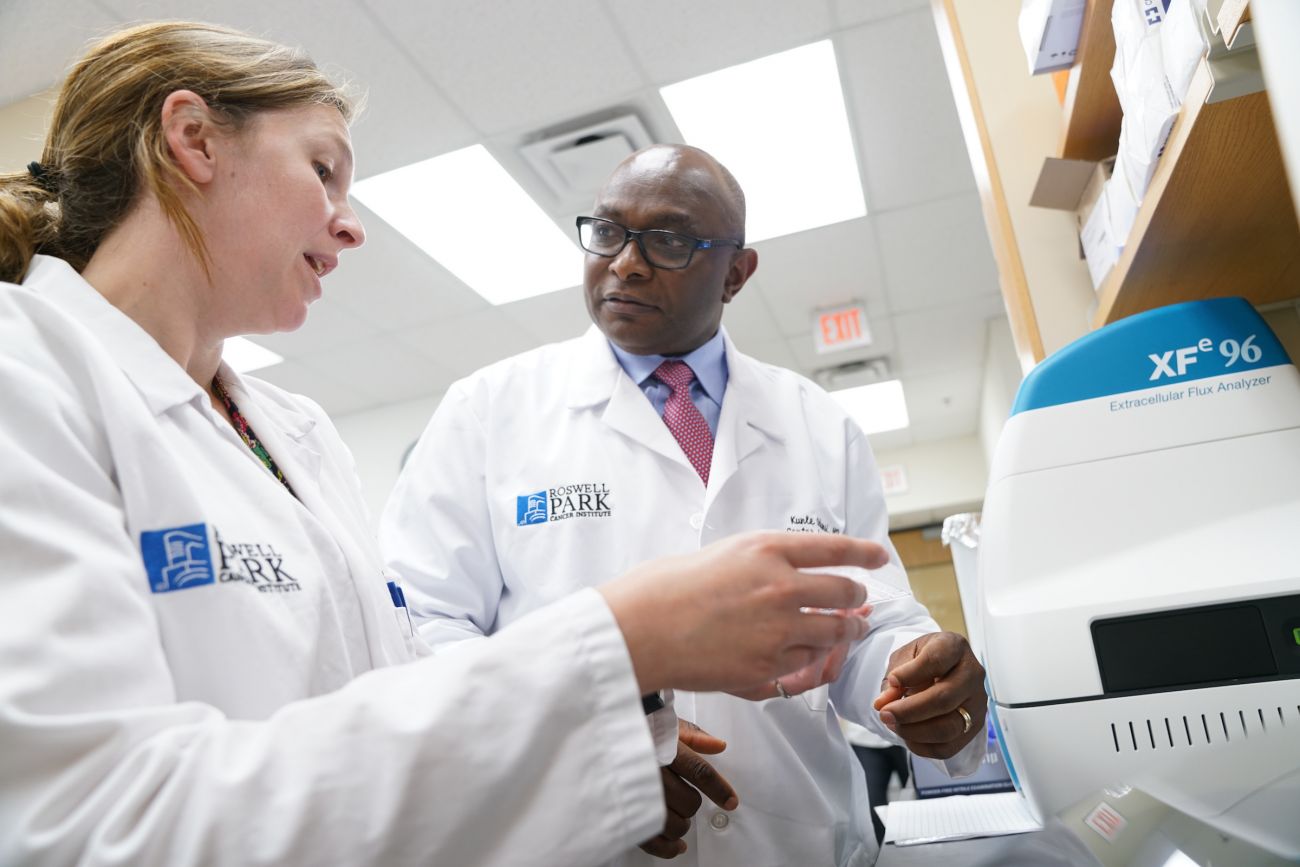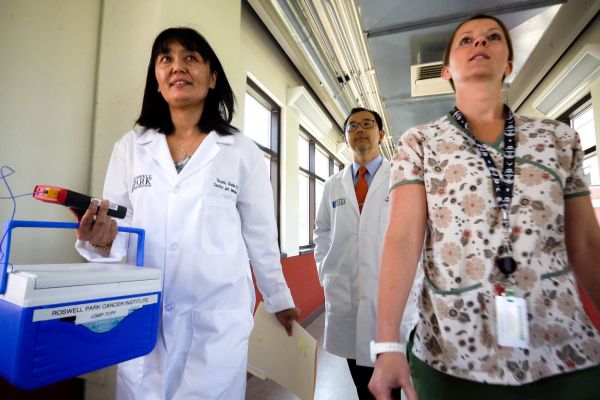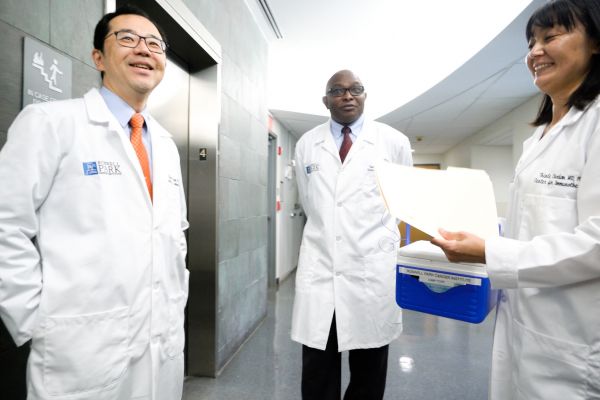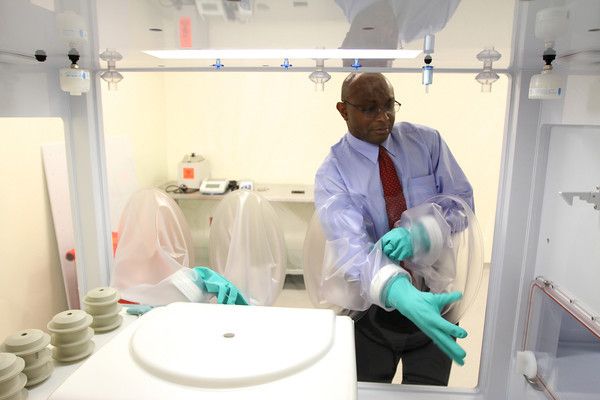Recently Roswell Park Comprehensive Cancer Center launched the world’s first phase I clinical trial of a specific type of adoptive T cell therapy. It marked the first time the Institute had produced a genetically engineered T cell therapy in-house in its Division of Translational Immuno-Oncology (DTIO). Learn more about immunotherapy innovation at Roswell Park in this final article of a three-part series.
For more information about this clinical trial, please call 1-877-275-7724.
What is immunotherapy? In a nutshell, it’s a treatment designed to strengthen a patient’s own immune system so it can successfully fight disease.
Immunotherapies for cancer have come a long way in just the past seven years: In 2010 the FDA approved the first cancer-treatment vaccine (Provenge®, for late-stage prostate cancer). Yesterday the FDA gave the green light to a second CAR-T cell therapy, Yescarta™ (for refractory large B-cell lymphoma), following its August approval of Kymriah™ for children and young adults with a specific type of acute lymphoblastic leukemia (ALL).
Kunle Odunsi, MD, PhD, formerly the Deputy Director of Roswell Park and Executive Director of the Division of Translational Immuno-Oncology, says immunotherapies have several advantages over standard treatments. Unlike chemotherapy or radiation, they target cancer cells only, not healthy cells; they produce long-term remission in some patients; many patients experience milder side effects with immunotherapies than with standard treatments; and immunotherapies can sometimes be effective in patients whose tumors have not responded to chemotherapy or radiation.
Never miss another Cancer Talk blog!
Sign up to receive our monthly Cancer Talk e-newsletter.
Sign up!Types of Immunotherapies at Roswell Park
Roswell Park is one of very few institutions in the United States equipped to offer clinical trials of a full range of immunotherapies. The Institute meets the FDA’s very strict standards for manufacturing both cellular therapies and vaccines. Having the manufacturing facilities next to the hospital speeds the delivery of the treatments to patients. It also means Roswell Park can launch its own immunotherapy clinical trials and participate in multi-center trials, making more options available to eligible patients.
Roswell Park offers several kinds of immunotherapy, including:
- Adoptive T cell therapies
- Therapeutic cancer vaccines
- Checkpoint inhibitors
- Oncolytic viruses
How do these treatments work, and what new immunotherapy clinical trials are underway or close to being launched? Here’s a brief introduction.
Adoptive T cell therapy
Adoptive T cell therapy begins when T lymphocytes, or T cells — the frontline soldiers of the immune system — are taken out of a patient’s blood sample. The T cells are then reengineered so that they produce T cell receptors, which help the T cells track down and destroy cancer cells. The super-charged T cells are then multiplied into an army of millions or billions and given back to the patient in the hope that they will help the immune system destroy the cancer.
Therapeutic Cancer Vaccines
Neoantigen (personalized) vaccines
Neoantigens are molecules produced by DNA mutations in cancer cells. They are present in cancer cells only, not in healthy cells. Neoantigens are collected from a patient’s tumor and used to manufacture a personalized vaccine designed to hunt down and destroy the cancer cells in that specific patient.
Allogeneic vaccines
Some vaccines work by targeting specific proteins found in tumors. Unlike neoantigen vaccines, which are customized to each patient, the same “off the shelf” allogeneic vaccine can be given to different patients. Roswell Park offers allogeneic vaccines through clinical trials, as well as the FDA-approved vaccine Provenge® for eligible patients with late-stage prostate cancer.
Checkpoint Inhibitors
Cancer cells essentially “put the brakes on the immune system when it should be doing its job to kill those cells,” says Dr. Odunsi. Investigators at Roswell Park’s Division of Translational Immuno-Oncology have identified several checkpoints, or molecules that put the brakes on the patient’s immune response, and are focusing on three of those — PD1, CTLA4, and IDO — to help improve the effectiveness of therapeutic cancer vaccines.
“We are one of the first to combine our vaccines with these immune modulators, or checkpoints,” explains Dr. Odunsi. “We have ongoing clinical trials where we not only vaccinate to generate immune cells, but also to limit the ability of checkpoints.”
Oncolytic virotherapies
An oncolytic virus is a special type of virus that infects and damages cancer cells but leaves healthy cells alone. Over the past three years, says Dr. Odunsi, Roswell Park’s DTIO has been working with different oncolytic viruses, which may also weaken cancer cells to make them more vulnerable to chemotherapy or radiation therapy.
____________________________________________________________________________________
Here are a few immunotherapy clinical trials that are underway or in the pipeline at Roswell Park. Check RoswellPark.org/Clinical-Trials or ClinicalTrials.gov for information about additional clinical trials.
Currently recruiting patients:
Study # I 258514 (adoptive T cell therapy) — “Gene-Modified T Cells in Treating Patients with Locally Advanced or Stage IV Solid Tumors Expressing NY-ESO-1”
Study # I 288216 (checkpoint inhibitors + chemotherapy) — “Olaparib, Durvalumab, and Tremelimumab in Treating Patients with Recurrent or Refractory Ovarian, Fallopian Tube or Primary Peritoneal Cancer with BRCA1 or BRCA2 Mutation”
Study # P 39716 (oncolytic virotherapy + checkpoint inhibitor) — “A Phase 1/2 Study to Investigate the Safety, Biologic and Anti-tumor Activity of ONCOS-102 in Combination with Durvalumab in Subjects with Advanced Peritoneal Malignancies”
Study # I 248613 (allogeneic vaccine + checkpoint inhibitor) — “DEC-205/NY-ESO-1 Fusion Protein CDX-1401, Poly ICLC, and ID01 Inhibitor INCB024360 in Treating Patients with Ovarian, Fallopian Tube, or Primary Peritoneal Cancer in Remission”
Study # I 285416 (checkpoint inhibitor + NY-ESO-1 vaccine + chemotherapy) — “Atezolizumab, Guadecitabine, and CDX-1401 Vaccine in Treating Patients with Recurrent Ovarian, Fallopian Tube, or Primary Peritoneal Cancer”
Study #I 283616 (adoptive T cell therapy + chemotherapy) — “Genetically Modified T Cells and Decitabine in Treating Patients with Recurrent or Refractory Ovarian, Primary Peritoneal, or Fallopian Tube Cancer"
This is the third in a series of three Cancer Talk blogs about a new immunotherapy developed at Roswell Park.
Part 2: Roswell Park Hopes to Deliver Two-Pronged Attack on Cancer Cells through New Immunotherapy Approach



